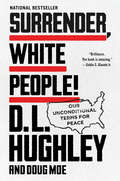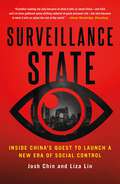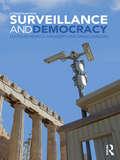- Table View
- List View
Surprise Attack: The Victim's Perspective, With a New Preface
by Ephraim KamEphraim Kam observes surprise attack through the eyes of its victim in order to understand the causes of the victim’s failure to anticipate the coming of war. Emphasizing the psychological aspect of warfare, Kam traces the behavior of the victim at various functional levels and from several points of view in order to examine the difficulties and mistakes that permit a nation to be taken by surprise. He argues that anticipation and prediction of a coming war are more complicated than any other issue of strategic estimation, involving such interdependent factors as analytical contradictions, judgmental biases, organizational obstacles, and political as well as military constraints.
Surprise, Kill, Vanish: The Definitive History of Secret CIA Assassins, Armies and Operators
by Annie JacobsenTHE USA TODAY BESTSELLER'As fast paced as a thriller' Fred Burton, Stratfor Talks' Pen and Sword Podcast'Jacobsen here presents a tour de force exploring the CIA's paramilitary activities...this excellent work feels like uncovering the tip of the iceberg ...Highly recommended for those seeking a better understanding of American foreign policy in action' Jacob Sherman, Library Journal 'A behind-the-scenes look at the most shadowy corners of the American intelligence community...Well-sourced and well-paced, this book is full of surprises' Kirkus'Annie Jacobsen takes us inside the darkest and most morally ambiguous corner of our government, where politicians ask brave men and women to kill-up close and personal-on America's behalf' Garrett M. Graff, author of Raven Rock: The Story of the U.S. Government's Secret Plan to Save Itself - While the Rest of us Die'This is a first rate book on the CIA, its paramilitary armies, operators, and assassins' New York Journal of Books'Having already demonstrated her remarkable aptitude for unearthing government secrets in books like Area 51 (2011) and The Pentagon's Brain (2015), Jacobsen pulls back the curtain on the history of covert warfare and state sanctioned assassinations from WWII to the present...Jacobsen's work revealing a poorly understood but essential slice of warfare history belongs in every library collection' BooklistThe definitive, character-driven history of CIA covert operations and U.S. government-sponsored assassinations, from the author of the Pulizter Prize finalist The Pentagon's BrainSince 1947, domestic and foreign assassinations have been executed under the C IA-led covert action operations team. Before that time, responsibility for taking out America's enemies abroad was even more shrouded in mystery. Despite Hollywood notions of last-minute rogue-operations and external secret hires, covert action is actually a cog in a colossal foreign policy machine, moving through, among others, the Bureau of Intelligence and Research, the House and Senate Select Committees. At the end of the day, it is the President, not the C IA, who is singularly in charge.For the first time, Pulitzer Prize finalist and New York Times bestselling author Annie Jacobsen takes us deep inside this top-secret history. With unparalleled access to former operatives, ambassadors, and even past directors of the Secret Service and CIA operations, Jacobsen reveals the inner workings of these teams, and just how far a U.S. president may go, covertly but lawfully, to pursue the nation's interests.
Surprise, Kill, Vanish: The Definitive History of Secret CIA Assassins, Armies and Operators
by Annie JacobsenThe definitive, character-driven history of CIA covert operations and U.S. government-sponsored assassinations, from the author of the Pulitzer Prize finalist The Pentagon's Brain.Since 1947, domestic and foreign assassinations have been executed under the CIA-led covert action operations team. Before that time, responsibility for taking out America's enemies abroad was even more shrouded in mystery. Despite Hollywood notions of last-minute rogue-operations and external secret hires, covert action is actually a cog in a colossal foreign policy machine, moving through, among others, the Bureau of Intelligence and Research, the House and Senate Select Committees. At the end of the day, it is the President, not the CIA, who is singularly in charge.When diplomacy fails and overt military action is not feasible, the President often calls on the Special Activities Division, the most secretive and lowest-profile branch of the CIA. It is this paramilitary team that undertakes dramatic and little-known assignments: hostage rescues, sabotage, and, of course, assassinations. For the first time, Pulitzer Prize finalist and New York Times bestselling author Annie Jacobsen takes us deep inside this top-secret history. With unparalleled access to former operatives, ambassadors, and even past directors of the Secret Service and CIA operations, Jacobsen reveals the inner workings of these teams, and just how far a U.S. president may go, covertly but lawfully, to pursue the nation's interests.(P)2019 Hachette Audio
Surprise, Kill, Vanish: The Secret History of CIA Paramilitary Armies, Operators, and Assassins
by Annie Jacobsen*The USA Today bestseller* Surprise... your target.Kill... your enemy.Vanish... without a trace.From Pulitzer Prize finalist Annie Jacobsen, the untold story of the CIA's secret paramilitary units. When diplomacy fails, and war is unwise, the president calls on the CIA's Special Activities Division, a highly-classified branch of the CIA and the most effective, black operations force in the world. Originally known as the president's guerrilla warfare corps, SAD conducts risky and ruthless operations that have evolved over time to defend America from its enemies. Almost every American president since World War II has asked the CIA to conduct sabotage, subversion and, yes, assassination. With unprecedented access to forty-two men and women who proudly and secretly worked on CIA covert operations from the dawn of the Cold War to the present day, along with declassified documents and deep historical research, Pulitzer Prize finalist Annie Jacobsen unveils-like never before-a complex world of individuals working in treacherous environments populated with killers, connivers and saboteurs. Despite Hollywood notions of off-book operations and external secret hires, covert action is actually one piece in a colossal foreign policy machine.Written with the pacing of a thriller, SURPRISE, KILL, VANISH brings to vivid life the sheer pandemonium and chaos, as well as the unforgettable human will to survive and the intellectual challenge of not giving up hope that define paramilitary and intelligence work. Jacobsen's exclusive interviews-with members of the CIA's Senior Intelligence Service (equivalent to the Pentagon's generals), its counterterrorism chiefs, targeting officers, and Special Activities Division's Ground Branch operators who conduct today's close-quarters killing operations around the world-reveal,for the first time, the enormity of this shocking, controversial and morally complex terrain. Is the CIA's paramilitary army America's weaponized strength, or a liability to its principled standing in the world? Every operation reported in this book, however unsettling, is legal.
Surrender Is Not an Option: Defending America at the United Nations
by John BoltonWith no-holds-barred candor, Donald Trump's new National Security Adviser and former ambassador to the United Nations takes us behind the scenes at the UN and the US State Department and reveals why his efforts to defend American interests and reform the UN resulted in controversy. He also shows how the US can lead the way to a more realistic global security arrangement for the twenty-first century and identifies the next generation of threats to America. In this revealing memoir, John Bolton recounts his appointment in 2005 as Ambassador to the United Nations, his headline-making Senate confirmation battle, and his sixteen-month tenure at the United Nations. Bolton offers keen insight into such international crises as North Korea's nuclear test, Iran's pursuit of nuclear weapons, the genocide in Darfur, the negotiation that produced the controversial end of hostilities between Israel and Hezbollah, and more. Chronicling both his successes and frustrations in taking a hard line against weapons-of-mass-destruction proliferators, terrorists, and rogue states such as North Korea and Iran, he also exposes the operational inadequacies that hinder the UN's effectiveness in international diplomacy and its bias against Israel and the United States. At home, he criticizes the bureaucratic inertia in the US State Department that can undermine presidential policy. This fascinating chronicle of the career of one of America's outstanding statesmen who has fought to preserve American sovereignty and strength at home and abroad now contains a new afterword, "Challenges for the Next President."
Surrender Or Starve: The Wars Behind The Famine (Vintage Departures Ser.)
by Robert D KaplanFamine in the Horn is both a tool and an aspect of ethnic conflict, with the Ethiopian Amharas of the central highlands pitted against the Eritreans and Tigreans of the north. The overwhelming majority of U.S. journalists have reported on Ethiopia from one side only-that of the Amharas in Addis Ababa. The author wants to show the story from the other side, in order to redress a grievous imbalance in news coverage. To get people excited, you sometimes have to light a fire, and that was the author’s intention. This book covers the period from late 1984 to the early part of 1987. In late 1987, the famine returned, mainly for the very reasons cited inside.
Surrender or Starve: Travels in Ethiopia, Sudan, Somalia, and Eritrea
by Robert D. KaplanRobert D. Kaplan is one of our leading international journalists, someone who can explain the most complicated and volatile regions and show why they're relevant to our world. In Surrender or Starve, Kaplan illuminates the fault lines in the Horn of Africa, which is emerging as a crucial region for America's ongoing war on terrorism. Reporting from Sudan, Ethiopia, Somalia, and Eritrea, Kaplan examines the factors behind the famine that ravaged the region in the 1980s, exploring the ethnic, religious, and class conflicts that are crucial for understanding the region today. He offers a new foreword and afterword that show how the nations have developed since the famine, and why this region will only grow more important to the United States. Wielding his trademark ability to blend on-the-ground reporting and cogent analysis, Robert D. Kaplan introduces us to a fascinating part of the world, one that it would behoove all of us to know more about.
Surrender, White People!: Our Unconditional Terms for Peace
by Doug Moe D. L. HughleyTHE NATIONAL BESTSELLER"Hughley uses his trademark humor to address the stark divisions in society that stem from centuries of white supremacy." —PeopleSurrender, white people! After 400 years of white supremacy in America, a reckoning is here. These are the terms of peace–and they are unconditional. Hope you brought a sense of humor, because this is gonna sting.After centuries of oppressing others, white people are in for a surprise: You’re about to be a minority yourself. Yes, the face of America is getting a lot browner—and a reckoning is coming. Black and brown folk are not going to take a back seat anymore. It’s time to surrender your unjust privileges and sue for peace while the getting’s still good. Lucky for America, D.L. Hughley has a plan.On the eve of America becoming a majority-minority nation, Hughley warns, the only way for America to move forward peacefully is if Whites face their history, put aside all their visions of superiority, and open up their institutions so they benefit everyone in this nation. But we can still have fun with this right? Surrender, White People! hilariously holds America account for its wrongs and offers D.L.'s satirical terms for reparations and reconciliation.But it’s not all bad news, white folks. The upside is that if you put D.L.’s plan into effect, you can FINALLY get black people to stop talking about oppression, discrimination, and their place in America. Now, that’s something we ALL can get behind.
Surrender: A Novel
by Ray Loriga"[A] riveting, and original, achievement."—WIREDFrom award-winning Spanish author Ray Loriga comes a dystopian novel about authority, manipulation, and the disappearance of privacy that &“calls to mind The Handmaid&’s Tale by Margaret Atwood [and] Blindness by José Saramago&” (Alfaguara Prize Winner Citation). Ten long years have passed since war first broke out, and one couple still does not know the whereabouts of their children, or what their country is even fighting for. They follow orders and their lives go by simply, routinely, until—one day—a mute boy walks onto their property. When the authorities announce that the area needs to be evacuated and that everyone must relocate to &“the transparent city,&” the three leave together. At first, the city proves to be a paradise: a stunning glass dome of endless highways, buildings, trains, and markets. Everything its inhabitants need is provided to them—food, protection, shelter—and the family quickly, unquestioningly, settles into their new life. But, soon, a sinister underlay begins to emerge. Neither secrets nor walls are permitted here, and strict order, authoritarian calm, and transparency must always reign supreme. In a society in which everything private is public, the most chilling portent of our future emerges. Surrender is an urgent novel about dignity and rebellion and the lengths we go to preserve love, hope, and humanity."Loriga envisions in this gripping tale an unsettling dystopia in which all secrets are forbidden...This memorable page-turner will appeal to fans of Brave New World."—Publishers Weekly
Surrender: Appeasing Islam, Sacrificing Freedom
by Bruce BawerWITH A NEW AFTERWORD In his controversial and critically acclaimed While Europe Slept, Bruce Bawer outlined the danger that Islamic immigration posed to traditional European values. In this provocative follow-up, he takes up the West's recent trend of silence and appeasement in the face of cultural intimidation by radical Islam. From an examination of coverage of the shocking murder of Dutch filmmaker Theo Van Gogh to the widespread denunciation of the Danish editors who published editorial cartoons mocking Mohammed, Bawer shows how radical Islam has cowed Western media, politicians, intellectuals, and religious leaders into believing that we must give up the right of free expression to peacefully coexist with the Muslim world. Fearless and excoriating, Surrender is an unapologetic and uncompromising defense of free speech that will stir conservatives and liberals alike.From the Trade Paperback edition.
Surrender: How the Clinton Administration Completed the Reagan Revolution
by Michael MeeropolMichael Meeropol argues that the ballooning of the federal budget deficit was not a serious problem in the 1980s, nor were the successful recent efforts to get it under control the basis for the prosperous economy of the mid-1990s. In this controversial book, the author provides a close look at what actually happened to the American economy during the years of the "Reagan Revolution" and reveals that the huge deficits had no negative effect on the economy. It was the other policies of the Reagan years--high interest rates to fight inflation, supply-side tax cuts, reductions in regulation, increased advantages for investors and the wealthy, the unraveling of the safety net for the poor--that were unsuccessful in generating more rapid growth and other economic improvements. Meeropol provides compelling evidence of the failure of the U. S. economy between 1990 and 1994 to generate rising incomes for most of the population or improvements in productivity. This caused, first, the electoral repudiation of President Bush in 1992, followed by a repudiation of President Clinton in the 1994 Congressional elections. The Clinton administration made a half-hearted attempt to reverse the Reagan Revolution in economic policy, but ultimately surrendered to the Republican Congressional majority in 1996 when Clinton promised to balance the budget by 2000 and signed the welfare reform bill. The rapid growth of the economy in 1997 caused surprisingly high government revenues, a dramatic fall in the federal budget deficit, and a brief euphoria evident in an almost uncontrollable stock market boom. Finally, Meeropol argues powerfully that the next recession, certain to come before the end of 1999, will turn the predicted path to budget balance and millennial prosperity into a painful joke on the hubris of public policymakers. Accessibly written as a work of recent history and public policy as much as economics, this book is intended for all Americans interested in issues of economic policy, especially the budget deficit and the Clinton versus Congress debates. No specialized training in economics is needed. "A wonderfully accessible discussion of contemporary American economic policy. Meeropol demonstrates that the Reagan-era policies of tax cuts and shredded safety nets, coupled with strident talk of balanced budgets, have been continued and even brought to fruition by the neo-liberal Clinton regime. " --Frances Fox Piven, Graduate School, City University of New York Michael Meeropol is Chair and Professor of Economics, Western New England College.
Surrendering to Utopia
by Mark GoodaleGoodale (conflict analysis and anthropology, George Mason U. ) explores anthropology's recent engagement with human rights and attempts to delineate an anthropological orientation to human rights in a series of five interconnected critical essays. His anthropological orientation points towards a synthetic approach, is cognizant of the intellectual history of different human rights genealogies, theorizes and legitimates human rights in terms of the groundedness of social practices, and is rooted in an emergent cosmopolitanism. Annotation ©2009 Book News, Inc. , Portland, OR (booknews. com)
Surrounded by Enemies: A Breakpoint Novel (The Breakpoint Novels #1)
by Bryce ZabelFor fans of Harry Turtledove, page-turning history meets political thriller in an alternative history novel that asks, What if JFK survived Dallas? President John F. Kennedy has lived through the ambush in Dealey Plaza. America holds its collective breath, seeing its president nearly executed in broad daylight. But as the country marches on, the office of the President finds itself under a much more insidious type of fire. Political scandal, an endless war, and a country coming apart at the seams take the 1960s in a terrifying new direction, and both John and his attorney-general brother, Bobby, struggle to stay ahead of their enemies, political and otherwise, and steer America toward a greater future…. Bryce Zabel is a master of the cover-up and the conspiracy, creating the sci-fi/alternative history series Dark Skies. Surrounded by Enemies is the first novel in the new Breakpoint series—each book exploring seminal moments in popular history and taking readers on a journey into a mirror world where events are both unexpected yet startlingly believable.WINNER OF THE 2013 SIDEWISE AWARD FOR ALTERNATE HISTORY &“I have some experience with shattered timelines and altered realities but this one kept me guessing every page.&”—Damon Lindelof, screenwriter & creator of Watchmen TV series &“Plausible development, building from what we know about what really did go on, and a whacking good story…Surrounded by Enemies delivers on both, big-time. So hold on to your hats, folks. You&’re in for quite a ride.&”—Harry Turtledove, alternative history author, Alpha and Omega
Surveillance Education: Navigating the Conspicuous Absence of Privacy in Schools (Critical Interventions)
by Nolan Higdon Allison ButlerSurveillance Education explores the pervasive use of digital surveillance technologies in schools and assesses its pernicious effects on students. Recognizing that the use of digital technologies will persist, the authors instead offer practical ways to ameliorate their impact.In our era of surveillance capitalism, digital media technologies are ever more intertwined into the educational process. Schools are presented with digital technologies as tools of convenience for gathering and grading student work, as tools of support to foster a more equitable learning environment, and as tools of safety for predicting or preventing violence or monitoring mental, emotional, and physical health. Despite a dearth of evidence to confirm their effectiveness, digital data collection and tracking is often presented as a way to improve educational outcomes and safety. This book challenges these fallacious assumptions and argues that the use of digital media technologies has caused great harm to students by subjecting them to oppressive levels of surveillance, impinging upon their right to privacy, and harvesting their personal data on behalf of Big-Tech. In doing so, the authors draw upon interviews from K–12 and higher education students, teachers, and staff, civil rights and technology lawyers, and educational technological programmers. The authors also provide practical guidance for teachers, administrators, students, and their families seeking to identify and combat surveillance in education.This urgent, eye-opening book will be of interest to students and educators with interests in critical media literacy and pedagogy and the sociology of technology and education.
Surveillance Futures: Social and Ethical Implications of New Technologies for Children and Young People (Emerging Technologies, Ethics and International Affairs)
by Emmeline Taylor Tonya RooneyFrom birth to adulthood, children now find themselves navigating a network of surveillance devices that attempt to identify, quantify, sort and track their thoughts, movements and actions. This book is the first collection to focus exclusively on technological surveillance and young people. Organised around three key spheres of children’s day-to-day life: schooling, the self and social lives, this book chronicles the increasing surveillance that children, of all ages, are subject to. Numerous surveillance apparatus and tools are examined, including, but not limited to: mobile phones, surveillance cameras, online monitoring, GPS and RFID tracking and big data analytics. In addition to chronicling the steady rise of such surveillance practices, the chapters in this volume identify and problematise the consequences of technological surveillance from a range of multidisciplinary perspectives. Bringing together leading scholars working across diverse fields – including sociology, education, health, criminology, anthropology, philosophy, media and information technology – the collection highlights the significant socio-political and ethical implications of technological surveillance throughout childhood and youth.
Surveillance Law, Data Retention and Human Rights: A Risk to Democracy (Routledge Research in Human Rights Law)
by Matthew WhiteThis book analyses the compatibility of data retention in the UK with the European Convention on Human Rights (ECHR). The increase in the use of modern technology has led to an explosion of generated data and, with that, a greater interest from law enforcement and intelligence agencies. In the early 2000s, data retention laws were introduced into the UK, and across the European Union (EU). This was met by domestic challenges before national courts, until a seminal ruling by the Court of Justice in the European Union (CJEU) ruled that indiscriminate data retention was incompatible with EU law. Since then, however, the CJEU has revised its position and made certain concessions, particularly under the guise of national security. This book focuses on data retention in the UK with the principal aim of examining compatibility with the ECHR. This is explored through a variety of ways including providing an account of democracy and why secret surveillance poses a threat to it, a history of data retention, assessing the seriousness that data retention poses to fundamental rights, the collection of rights that are affected by data retention which are crucial for a functioning democracy, the implications of who can be obligated to retain (and what to retain), the idea that data retention is a form of surveillance and ultimately, with all things considered, whether this is compatible with the ECHR. The work will be an invaluable resource for students, academics, researchers and policy-makers working in the areas of privacy, human rights law and surveillance.
Surveillance Means Security: Remixed War Propaganda
by J. R. Norton Micah Ian WrightSubversive and incendiary, this full-color poster book reworks classic war propaganda to comment on corporate corruption, domestic spying, election fraud, gay marriage, blind patriotism, the "War on Terror," and surveillance in America today.With laughs and jeers, Wright's distinctive artwork and astute political commentary offers timely and clever insight into the state of post-9/11 America. Surveillance Means Security! is the hilarious follow-up to Wright's previous books of reworked propaganda posters, You Back The Attack! We'll Bomb Who We Want! and If You're Not A Terrorist ...Then Stop Asking Questions.
Surveillance State: Inside China's Quest to Launch a New Era of Social Control
by Josh Chin Liza LinWhere is the line between digital utopia and digital police state?Surveillance State tells the gripping, startling, and detailed story of how China’s Communist Party is building a new kind of political control: shaping the will of the people through the sophisticated—and often brutal—harnessing of data.It is a story born in Silicon Valley and America’s “War on Terror,” and now playing out in alarming ways on China’s remote Central Asian frontier. As ethnic minorities in a border region strain against Party control, China’s leaders have built a dystopian police state that keeps millions under the constant gaze of security forces armed with AI. But across the country in the city of Hangzhou, the government is weaving a digital utopia, where technology helps optimize everything from traffic patterns to food safety to emergency response.Award-winning journalists Josh Chin and Liza Lin take readers on a journey through the new world China is building within its borders, and beyond. Telling harrowing stories of the people and families affected by the Party’s ambitions, Surveillance State reveals a future that is already underway—a new society engineered around the power of digital surveillance.
Surveillance Valley: The Secret Military History of the Internet
by Yasha LevineThe internet is the most effective weapon the government has ever built.In this fascinating book, investigative reporter Yasha Levine uncovers the secret origins of the internet, tracing it back to a Pentagon counterinsurgency surveillance project.A visionary intelligence officer, William Godel, realized that the key to winning the war in Vietnam was not outgunning the enemy, but using new information technology to understand their motives and anticipate their movements. This idea--using computers to spy on people and groups perceived as a threat, both at home and abroad--drove ARPA to develop the internet in the 1960s, and continues to be at the heart of the modern internet we all know and use today. As Levine shows, surveillance wasn't something that suddenly appeared on the internet; it was woven into the fabric of the technology.But this isn't just a story about the NSA or other domestic programs run by the government. As the book spins forward in time, Levine examines the private surveillance business that powers tech-industry giants like Google, Facebook, and Amazon, revealing how these companies spy on their users for profit, all while doing double duty as military and intelligence contractors. Levine shows that the military and Silicon Valley are effectively inseparable: a military-digital complex that permeates everything connected to the internet, even coopting and weaponizing the antigovernment privacy movement that sprang up in the wake of Edward Snowden.With deep research, skilled storytelling, and provocative arguments, Surveillance Valley will change the way you think about the news--and the device on which you read it.
Surveillance and Control in Israel/Palestine: Population, Territory and Power (Routledge Studies in Middle Eastern Politics)
by Elia ZureikSurveillance is always a means to an end, whether that end is influence, management or entitlement. This book examines the several layers of surveillance that control the Palestinian population in Israel and the Occupied Territories, showing how they operate, how well they work, how they are augmented, and how in the end their chief purpose is population control. Showing how what might be regarded as exceptional elsewhere is here regarded as the norm, the book looks not only at the political economy of surveillance and its technological and military dimensions, but also at the ordinary ways that Palestinians in Israel and the occupied territories are affected in their everyday lives. Written in a clear and accessible style by experts in the field, this book will have large appeal for academic faculty as well as graduate and senior undergraduate students in sociology, political science, international relations, surveillance studies and Middle East studies.
Surveillance and Democracy
by Kevin D. HaggertyThis collection represents the first sustained attempt to grapple with the complex and often paradoxical relationships between surveillance and democracy. Is surveillance a barrier to democratic processes, or might it be a necessary component of democracy? How has the legacy of post 9/11 surveillance developments shaped democratic processes? As surveillance measures are increasingly justified in terms of national security, is there the prospect that a shadow "security state" will emerge? How might new surveillance measures alter the conceptions of citizens and citizenship which are at the heart of democracy? How might new communication and surveillance systems extend (or limit) the prospects for meaningful public activism? Surveillance has become central to human organizational and epistemological endeavours and is a cornerstone of governmental practices in assorted institutional realms. This social transformation towards expanded, intensified and integrated surveillance has produced many consequences. It has also given rise to an increased anxiety about the implications of surveillance for democratic processes; thus raising a series of questions – about what surveillance means, and might mean, for civil liberties, political processes, public discourse, state coercion and public consent – that the leading surveillance scholars gathered here address.
Surveillance and Space (Society and Space)
by Francisco KlauserThe digital age is also a surveillance age. Today, computerized systems protect and manage our everyday life; the increasing number of surveillance cameras in public places, the computerized loyalty systems of the retail sector, geo-localized smart-phone applications, or smart traffic and navigation systems. Surveillance is nothing fundamentally new, and yet more and more questions are being asked: Who monitors whom, and how and why? How do surveillance techniques affect socio-spatial practices and relationships? How do they shape the fabrics of our cities, our mobilities, the spaces of the everyday? And what are the implications in terms of border control and the exercise of political power? Surveillance and Space responds to these modern questions by exploring the complex and varied interactions between surveillance and space. In doing so, the book also advances a programmatic reflection on the very possibility of a ‘political geography of surveillance’.
Surveillance and Surveillance Detection: A CIA Insider's Guide
by John KiriakouHave you ever thought you were being followed or watched? Have you ever needed to follow or observe someone and not be seen?In the world of espionage, surveillance and surveillance detection are a way of life. It is the job of every CIA operations officer to make sure he or she is not under surveillance—that is, being followed to the commission of an &“operational act.&” It is also the job of every CIA operations officer to surveil his own targets, whether they are terrorists or terrorist suspects, foreign intelligence officers, hostile actors, or even sometimes his own agents for vetting purposes. In everyday life, many people from all walks of life need to know how to perform similar operations. Whether avoiding a stalker, checking up on an unfaithful partner, or just securing one&’s own privacy, a working knowledge of modern surveillance and surveillance detection techniques is a critical skill to possess. And there is nobody better to teach that skill than someone trained by the CIA.From former CIA counterterrorism officer John C. Kiriakou, Surveillance and Surveillance Detection: A CIA Insider's Guide takes you through the CIA's surveillance and surveillance detection program. It will teach you to apply CIA surveillance techniques to your own everyday life. You&’ll learn how to stay safe, to ensure your privacy, and to keep the honest people honest—the CIA way.
Surveillance and Terror in Post-9/11 British and American Television
by Darcie Rives-EastThis interdisciplinary study examines how state surveillance has preoccupied British and American television series in the twenty years since 9/11. Surveillance and Terror in Post-9/11 British and American Television illuminates how the U.S. and U.K., bound by an historical, cultural, and television partnership, have broadcast numerous programs centred on three state surveillance apparatuses tasked with protecting us from terrorism and criminal activity: the prison, the police, and the national intelligence agency. Drawing from a range of case studies, such as Sherlock, Orange is the New Black and The Night Manager, this book discusses how television allows viewers, writers, and producers to articulate fears about an increased erosion of privacy and civil liberties following 9/11, while simultaneously expressing a desire for a preventative mechanism that can stop such events occurring in the future. However, these concerns and desires are not new; encompassing surveillance narratives both past and present, this book demonstrates how television today builds on earlier narratives about panoptic power to construct our present understanding of government surveillance.























